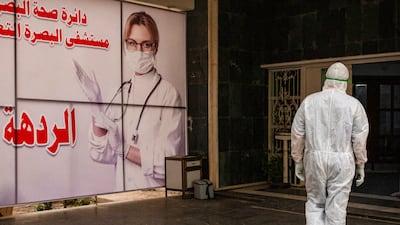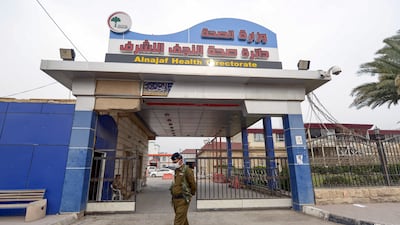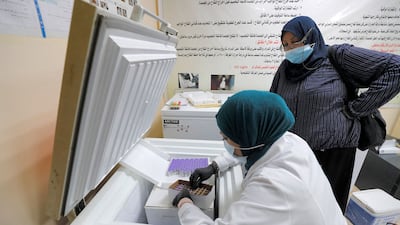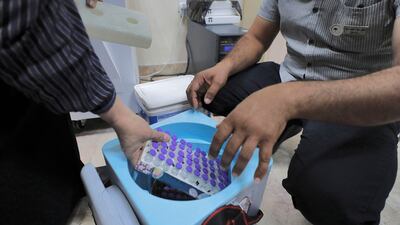In Iraq, many doctors fear for their lives.
Doctors for years have faced physical and verbal abuse from the families of some patients who die in their care.
With at least 800 Covid-19 patients succumbing to the third wave of the pandemic in Iraq this month alone, medical practitioners in the capital say they are seeing an increase in attacks from bereaved relatives since the pandemic began.
While an official number of attacks has not been compiled, Abbas Al Taan, a general practitioner at Al Rusafa Hospital in Baghdad, estimates dozens have occurred over the past 18 months. The most recent high profile case to be shared on social media was on July 12, when armed men stormed Al Kindi Hospital in the capital after the death of four coronavirus patients.
“The threats and intimidation have become a culture,” Dr Al Taan told The National. “Every week we see a grisly incident of an attack on a doctor across Iraq unfolding online. Many go unrecorded.”
Graphic videos of doctors being beaten in other parts of the country have appeared on social media. Families of patients in critical condition have also attacked hospitals with firearms and smashed equipment and ventilators already in short supply.
Some doctors have even received death threats from powerful tribes tied to the families. There have also been demands for blood money from doctors when a patient dies.
Sub-par infrastructure
Years of civil strife and inadequate funding have left Iraq’s healthcare system in tatters. The doctors say they cannot be held responsible for the ill-equipped hospitals battling a surge in cases.
Iraq has recorded more than 1.5 million coronavirus cases since the start of the pandemic. The actual number is thought to be higher, because many have remained unreported as people avoid going to government hospitals.
More than 18,000 people have died since the first case was detected in February last year.
Covid-19 units have been hastily built, resulting in sub-par construction. Long power cuts and a shortage of oxygen, vital for treatment, have not helped.
The recent situation in hospitals across Iraq has been particularly dire, with two deadly fires breaking out in less than three months in Covid-19 units. The first killed more than 90 people in Baghdad in April. The second, in Nasiriyah earlier this month, claimed at least 60 lives.
Adding to the doctors’ distress are patients who initially refused hospital treatment, fearing they would have to quarantine in government facilities. By the time they were admitted, it was too late.
The Health Ministry estimated at least eight doctors have died of Covid-19 and nearly 600 contracted the virus since February last year, mainly because of the severe shortage of personal protective equipment.
Blood money
Meanwhile, the doctors have had to contend with regular threats of tribal attacks and demands for blood money, said Ali Al Anbouri, a professor at the University of Baghdad’s Al Kindy College Of Medicine.
If the Arabic death threat Matloub Dam is found written on the door of his or her house, the doctor has to contact the clan of the deceased and pay compensation. Some doctors go into hiding with their families until they manage to negotiate a settlement, says Dr Al Anbouri.
“We have in Iraq very influential tribes who see the doctor as a symbol of state failure and vent their anger on the medical staff,” Prof Al Anbouri told The National. “Too many doctors have fled as they either couldn’t afford the blood money or out of despair.”
Representatives of the Iraqi Medical Association sometimes act as the agent between the tribes and the doctors in blood money cases, an official at the association said.
“The doctors know the state laws will lead them nowhere and they don't want to gamble with their lives,” he said.
Iraqi doctors have started abandoning a healthcare system that was the envy of the Middle East in the 1960s and the 1970s. As many as 20,000 of the over 52,000 registered physicians have reportedly left the country of 40 million people since the 1990s.
Gasping for breath
Poor health care has been among the core grievances of the mass protests that broke out in late 2019. Iraqis demand an overhaul of a political system that, they say, is corrupt, has plundered state resources and pushed ordinary people into poverty.
In 2019, health minister Alaa Alwan resigned, citing insurmountable corruption and threats from people opposed to his reform efforts.
“Our hospitals are not an option [for care],” said Hussein Jasim, a 45-year-old security guard at a shopping mall in Baghdad.
“Where do I start? The lack of hygiene among doctors and nurses, the lack of basic supplies or the lack of oxygen canisters or the lack of beds or the fires that gut sick patients? I’d rather die at home.”
Every house in Baghdad has a tragic story to tell about the loss of a family member to Covid, said Mr Jasim, who lost his uncle to the virus in April. Still, he condemns the recurrent attacks on doctors as “barbaric and unjustifiable”.
New laws
In recent months, doctors across the country have staged sit-ins, demanding new laws to protect them. The current law, which stipulates six to 12 months in prison and a fine for assaulting a government employee, is hardly a deterrent.
There have also been mounting calls from medical staff to carry weapons. But that cannot be a solution, Prof Al Anbouri said.
“I’m totally against arming doctors,” he said. “I understand the deep frustrations of my fellows, but it’s the government’s responsibility to protect us.”
The Health Ministry could not be reached for comment despite numerous attempts.
The only ray of hope has been the recent increase in the albeit slow pace of Covid-19 vaccinations. Iraq has so far vaccinated just 1.3 million people or around 1 per cent of the total population, according to the latest official data.
During the last week reported, Iraq averaged about 18,834 doses administered each day. At that rate, it will still take a further 418 days to administer enough doses for another 10 per cent of the population.
The health authorities have also teamed up with international organisations such as the Red Cross and Doctors Without Borders to help set up additional intensive care units and testing centres as well as to train doctors and medical staff on how to cope with the pandemic.








